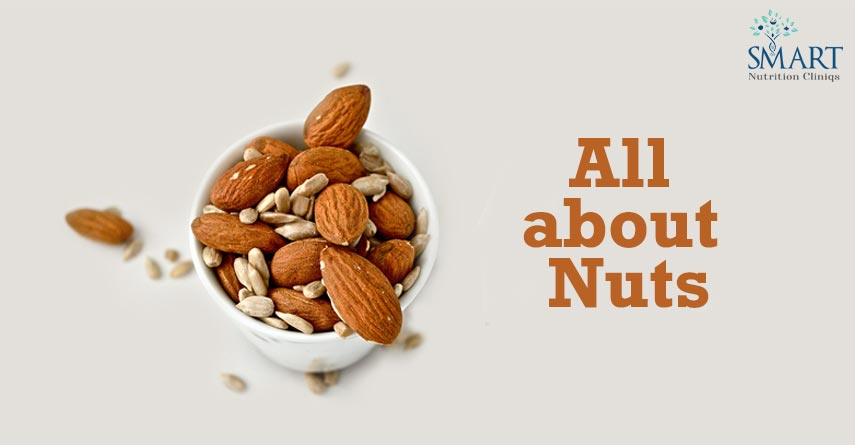When my weight loss candidates ask me for some healthy snack ideas, nuts are my first choice on the list.
Nuts are seeds or fruits consisting of an edible, fat containing, softer part surrounded by a hard or brittle shell. Nuts possess rich flavor and are used in various food preparations.
Nuts are rich in protein and fat, but low in carbohydrate, that’s why they serve as concentrated source of protein and energy. Good news is nuts are low on saturated fat and contain high percentage of healthy fats like MUFAs and PUFAs – mainly omega-3 fats, the reason behind their cholesterol lowering property!!
Nuts also contain several minerals like selenium, potassium, iron, manganese, copper, magnesium, phosphorus and zinc.
Nuts are also high in bioactive molecules like phytochemicals, plant sterols, and dietary fibre that prompts cardio-protective effects.
Nuts are also called as “concentrated foods” as they contain less water, require proper chewing specially after bariatric surgery for easy digestion. They are rich in vitamin E, particularly almonds. Nuts are also high in B-vitamins specially B1, B2, B3 and B9.
Walnuts:
Walnuts are highest in antioxidants and omega-3 fatty acids, which helps in decreasing risk of heart disease. At least 30g a day or seven whole walnuts is a good amount to obtain health benefits.
Almonds:
Almonds are incredibly dense in nutrients, having 20% protein. They contain fiber, MUFAs (healthy fat), vitamin B and E, together these nutrients helps in prevention of heart disease.
Groundnuts:
Groundnuts also called as peanuts or monkey nuts, are rich in antioxidant flavonol and vitamin B3. They contain 40% fat, which is double the amount in soybeans.
For the convenience nuts are sold in shelled form, however unshelled nuts can be stored longer without affecting their taste, appearance and nutritive value than shelled nuts. Similarly unsalted nuts develop rancidity (complete or incomplete oxidation of fats & oils present in nuts when exposed to air, light or moisture or by bacterial action, resulting in unpleasant taste and odor) slower than salted nuts. We may prevent rancidity by keeping nuts in airtight containers under refrigeration or in freezer for several months.
Groundnuts, cashewnuts, almonds, pistachio and walnuts contains 25.3g, 21.2g, 20.8g, 19.8g and 15.6 g protein per 100g respectively.
Nuts can be added to different food stuffs as whole, halved, flaked, ground or dehydrated. They can be added as thickening agents to gravies, in chutneys, as sweets (**caution for bariatric patients), as salad dressings or can be added as garnishing in ice-creams, cakes, pastries and porridges.
Being a weight loss dietician, I always recommend to include nuts in daily diet, choose them judiciously and use in moderation as raw, roasted, salted or boiled forms.
Nuts are good to give your day a kick start, to fill gap between two meals, to keep you full for longer and to provide good amount of proteins and healthy fats.






